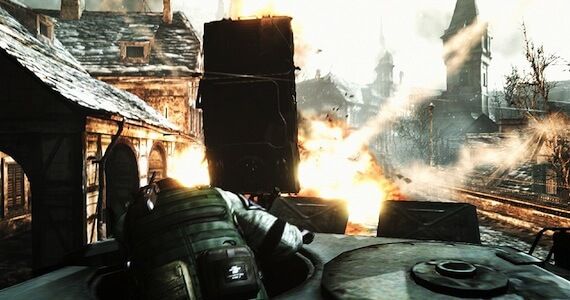For many long-time Resident Evil fans, the on-going evolution of the series has been somewhat of a bumpy, and at a times downright frustrating, journey. Understandably, it's been hard for players with fond memories of scarce ammunition, tank controls, and plodding zombie encounters to accept the current state of the Resident Evil experience - dominated by action-shooter elements with little tension and/or actual scares. Resident Evil 4 succeeded as a hybrid of sorts - with both a spooky atmosphere, improved controls, and new diversified enemy types. However, right out the gate, it was clear that Resident Evil 5 would be taking the action-over-horror approach - as, even in the first chapter, players were overrun by a sizable horde of enemies in broad daylight.
While many die-hard fans had been hoping that Capcom might dial the action back (and up the horror quotient) for Resident Evil 6, the game's announcement trailer made it apparent that the developer intended to push the franchise even further into the action-shooter mainstream. Now, Capcom is outright addressing the shift in gameplay style - asserting that the survival horror market is just too niche for the Resident Evil series.
Speaking with Gamasutra, Capcom's Resident Evil: Revelations producer Masachika Kawata responded to the growing chorus of frustrated Resident Evil die-hards who feel as though the developer has undermined what made the series great - in favor of appealing to mainstream gamers:
"Especially for the North American market, I think the series needs to head in that [action-oriented] direction. [Resident Evil's primary games] need to be an extension of the changes made in Resident Evil 4 and Resident Evil 5. RE4 started in that direction, and RE5 kept going in that direction. And I think that especially for the North American market, we need to keep going in that direction, and take that a step further. And that's exactly one of the reasons that Revelations is the way it is. Looking at the marketing data [for survival horror games] ... the market is small, compared to the number of units Call of Duty and all those action games sell. A 'survival horror' Resident Evil doesn't seem like it'd be able to sell those kind of numbers."
Sales figures do support Kawata's position. While many gamers might remember attending a spirited midnight release party for Resident Evil 5, the game actually isn't a record-breaking blockbuster. Since its release in March 2009, the title has sold over 5.8 million copies (as of June 2011) — which, no doubt, represents a success for the publisher.
However, compared to a well known action-adventure series, such as Assassin's Creed, it's easy to see why Capcom would like to move away from the survival horror stigma. Assassin’s Creed 2, which launched months later (in November of 2009) nearly doubled the RE5 numbers by January 2010 alone (racking up 9 million copies sold).
As for the direction of the Resident Evil series going forward, Kawata wasn't willing to outright say that Capcom would abandon survival horror altogether, in favor of action, but name-dropping Call of Duty is certainly no coincidence here:
"I can't really speak for Resident Evil 6, but I don't think that it necessarily has to go all the way in that [action-heavy] direction, the Call of Duty direction. It doesn't have to be a straight up shooter. But my impression is that Resident Evil 4 and 5 aren't shooters, per se. So I think that by extending the market in this sense, we can still have the numbered titles keep their identity about what Resident Evil is supposed to be, but still expand and hit other markets as well."
While Resident Evil 6 is expected to feature a number of upgrades to core game mechanics (such as the ability to slide into cover), and in spite of frustrations from Resident Evil fans looking for a true survival horror experience, it's unfair to say that Capcom's RE series has abandoned all of the elements that made it a household name. Limited mobility and scare resources are still an integral part of the series - even if the boss fights are bigger and feature a lot more action-chorography. Considering the numerous RE spin-off games (on a variety of different platforms), another new movie installment on the way, and other franchise tie-ins on the horizon, it's hard to blame Capcom for trying to get the most bang for their buck - especially given how recognizable Resident Evil is among die-hard and casual gamers alike.
At this point, plenty of long-time survival horror fans have started to look elsewhere (such as to the Dead Space series) for the tense atmosphere that used to thrive in the Resident Evil franchise. Whether or not Capcom's action gamble will pay-off with huge sales numbers for Resident Evil 6 this November remains to be seen - especially since removing survival horror elements and appealing to Call of Duty gamers led to an uninspiring final product in the Resident Evil: Operation Raccoon City spin-off.
Resident Evil 6 releases November 20, 2012, on the PS3 and Xbox 360, with a PC release to follow.
-
Follow me on Twitter @benkendrick for further updates.
Source: Gamasutra

